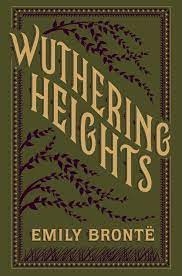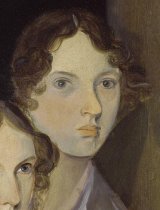Wuthering Heights Page #9
Wuthering Heights is an 1847 novel by Emily Brontë, initially published under the pseudonym Ellis Bell. It concerns two families of the landed gentry living on the West Yorkshire moors, the Earnshaws and the Lintons, and their turbulent relationships with Earnshaw's adopted son, Heathcliff.
We exchanged little conversation, and he halted at the entrance of Thrushcross Park, saying, I could make no error there. Our adieux were limited to a hasty bow, and then I pushed forward, trusting to my own resources; for the porter’s lodge is untenanted as yet. The distance from the gate to the grange is two miles; I believe I managed to make it four, what with losing myself among the trees, and sinking up to the neck in snow: a predicament which only those who have experienced it can appreciate. At any rate, whatever were my wanderings, the clock chimed twelve as I entered the house; and that gave exactly an hour for every mile of the usual way from Wuthering Heights. My human fixture and her satellites rushed to welcome me; exclaiming, tumultuously, they had completely given me up: everybody conjectured that I perished last night; and they were wondering how they must set about the search for my remains. I bid them be quiet, now that they saw me returned, and, benumbed to my very heart, I dragged upstairs; whence, after putting on dry clothes, and pacing to and fro thirty or forty minutes, to restore the animal heat, I adjourned to my study, feeble as a kitten: almost too much so to enjoy the cheerful fire and smoking coffee which the servant had prepared for my refreshment. CHAPTER IV What vain weathercocks we are! I, who had determined to hold myself independent of all social intercourse, and thanked my stars that, at length, I had lighted on a spot where it was next to impracticable—I, weak wretch, after maintaining till dusk a struggle with low spirits and solitude, was finally compelled to strike my colours; and under pretence of gaining information concerning the necessities of my establishment, I desired Mrs. Dean, when she brought in supper, to sit down while I ate it; hoping sincerely she would prove a regular gossip, and either rouse me to animation or lull me to sleep by her talk. “You have lived here a considerable time,” I commenced; “did you not say sixteen years?” “Eighteen, sir: I came when the mistress was married, to wait on her; after she died, the master retained me for his housekeeper.” “Indeed.” There ensued a pause. She was not a gossip, I feared; unless about her own affairs, and those could hardly interest me. However, having studied for an interval, with a fist on either knee, and a cloud of meditation over her ruddy countenance, she ejaculated—“Ah, times are greatly changed since then!” “Yes,” I remarked, “you’ve seen a good many alterations, I suppose?” “I have: and troubles too,” she said. “Oh, I’ll turn the talk on my landlord’s family!” I thought to myself. “A good subject to start! And that pretty girl-widow, I should like to know her history: whether she be a native of the country, or, as is more probable, an exotic that the surly indigenae will not recognise for kin.” With this intention I asked Mrs. Dean why Heathcliff let Thrushcross Grange, and preferred living in a situation and residence so much inferior. “Is he not rich enough to keep the estate in good order?” I inquired. “Rich, sir!” she returned. “He has nobody knows what money, and every year it increases. Yes, yes, he’s rich enough to live in a finer house than this: but he’s very near—close-handed; and, if he had meant to flit to Thrushcross Grange, as soon as he heard of a good tenant he could not have borne to miss the chance of getting a few hundreds more. It is strange people should be so greedy, when they are alone in the world!” “He had a son, it seems?” “Yes, he had one—he is dead.” “And that young lady, Mrs. Heathcliff, is his widow?” “Yes.” “Where did she come from originally?” “Why, sir, she is my late master’s daughter: Catherine Linton was her maiden name. I nursed her, poor thing! I did wish Mr. Heathcliff would remove here, and then we might have been together again.” “What! Catherine Linton?” I exclaimed, astonished. But a minute’s reflection convinced me it was not my ghostly Catherine. “Then,” I continued, “my predecessor’s name was Linton?” “It was.” “And who is that Earnshaw: Hareton Earnshaw, who lives with Mr. Heathcliff? Are they relations?” “No; he is the late Mrs. Linton’s nephew.” “The young lady’s cousin, then?” “Yes; and her husband was her cousin also: one on the mother’s, the other on the father’s side: Heathcliff married Mr. Linton’s sister.” “I see the house at Wuthering Heights has ‘Earnshaw’ carved over the front door. Are they an old family?” “Very old, sir; and Hareton is the last of them, as our Miss Cathy is of us—I mean, of the Lintons. Have you been to Wuthering Heights? I beg pardon for asking; but I should like to hear how she is!” “Mrs. Heathcliff? she looked very well, and very handsome; yet, I think, not very happy.” “Oh dear, I don’t wonder! And how did you like the master?” “A rough fellow, rather, Mrs. Dean. Is not that his character? “Rough as a saw-edge, and hard as whinstone! The less you meddle with him the better.” “He must have had some ups and downs in life to make him such a churl. Do you know anything of his history?” “It’s a cuckoo’s, sir—I know all about it: except where he was born, and who were his parents, and how he got his money at first. And Hareton has been cast out like an unfledged dunnock! The unfortunate lad is the only one in all this parish that does not guess how he has been cheated.” “Well, Mrs. Dean, it will be a charitable deed to tell me something of my neighbours: I feel I shall not rest if I go to bed; so be good enough to sit and chat an hour.” “Oh, certainly, sir! I’ll just fetch a little sewing, and then I’ll sit as long as you please. But you’ve caught cold: I saw you shivering, and you must have some gruel to drive it out.” The worthy woman bustled off, and I crouched nearer the fire; my head felt hot, and the rest of me chill: moreover, I was excited, almost to a pitch of foolishness, through my nerves and brain. This caused me to feel, not uncomfortable, but rather fearful (as I am still) of serious effects from the incidents of to-day and yesterday. She returned presently, bringing a smoking basin and a basket of work; and, having placed the former on the hob, drew in her seat, evidently pleased to find me so companionable. Before I came to live here, she commenced—waiting no farther invitation to her story—I was almost always at Wuthering Heights; because my mother had nursed Mr. Hindley Earnshaw, that was Hareton’s father, and I got used to playing with the children: I ran errands too, and helped to make hay, and hung about the farm ready for anything that anybody would set me to. One fine summer morning—it was the beginning of harvest, I remember—Mr. Earnshaw, the old master, came downstairs, dressed for a journey; and, after he had told Joseph what was to be done during the day, he turned to Hindley, and Cathy, and me—for I sat eating my porridge with them—and he said, speaking to his son, “Now, my bonny man, I’m going to Liverpool to-day, what shall I bring you? You may choose what you like: only let it be little, for I shall walk there and back: sixty miles each way, that is a long spell!” Hindley named a fiddle, and then he asked Miss Cathy; she was hardly six years old, but she could ride any horse in the stable, and she chose a whip. He did not forget me; for he had a kind heart, though he was rather severe sometimes. He promised to bring me a pocketful of apples and pears, and then he kissed his children, said good-bye, and set off.
Translation
Translate and read this book in other languages:
Select another language:
- - Select -
- 简体中文 (Chinese - Simplified)
- 繁體中文 (Chinese - Traditional)
- Español (Spanish)
- Esperanto (Esperanto)
- 日本語 (Japanese)
- Português (Portuguese)
- Deutsch (German)
- العربية (Arabic)
- Français (French)
- Русский (Russian)
- ಕನ್ನಡ (Kannada)
- 한국어 (Korean)
- עברית (Hebrew)
- Gaeilge (Irish)
- Українська (Ukrainian)
- اردو (Urdu)
- Magyar (Hungarian)
- मानक हिन्दी (Hindi)
- Indonesia (Indonesian)
- Italiano (Italian)
- தமிழ் (Tamil)
- Türkçe (Turkish)
- తెలుగు (Telugu)
- ภาษาไทย (Thai)
- Tiếng Việt (Vietnamese)
- Čeština (Czech)
- Polski (Polish)
- Bahasa Indonesia (Indonesian)
- Românește (Romanian)
- Nederlands (Dutch)
- Ελληνικά (Greek)
- Latinum (Latin)
- Svenska (Swedish)
- Dansk (Danish)
- Suomi (Finnish)
- فارسی (Persian)
- ייִדיש (Yiddish)
- հայերեն (Armenian)
- Norsk (Norwegian)
- English (English)
Citation
Use the citation below to add this book to your bibliography:
Style:MLAChicagoAPA
"Wuthering Heights Books." Literature.com. STANDS4 LLC, 2025. Web. 14 Mar. 2025. <https://www.literature.com/book/wuthering_heights_1627>.








Discuss this Wuthering Heights book with the community:
Report Comment
We're doing our best to make sure our content is useful, accurate and safe.
If by any chance you spot an inappropriate comment while navigating through our website please use this form to let us know, and we'll take care of it shortly.
Attachment
You need to be logged in to favorite.
Log In